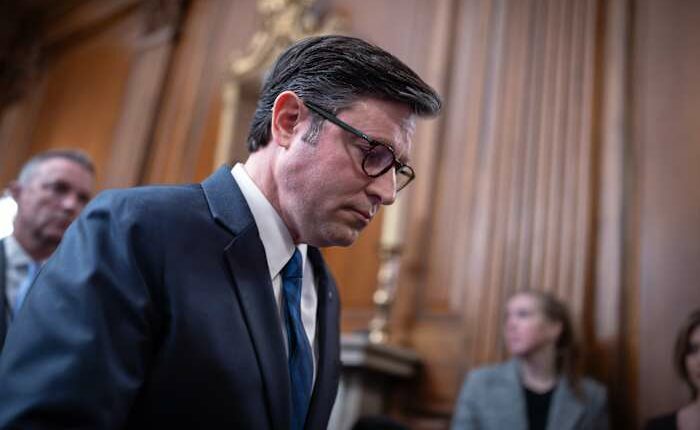Share this @internewscast.com

WASHINGTON – After returning from an overseas trip, President Donald Trump urged the Senate to abolish the filibuster in order to end the protracted government shutdown, which has persisted for a month. This call diverges from the stance of most Republican leaders who have historically resisted such a measure.
In a social media post on Thursday, Trump declared, “THE CHOICE IS CLEAR — INITIATE THE ‘NUCLEAR OPTION,’ GET RID OF THE FILIBUSTER.”
The president’s unexpected intervention in the shutdown discussions, especially by advocating for the elimination of the filibuster, is likely to stir tensions within the Senate. This move could either prompt senators to seek a compromise or escalate the situation further.
Trump has been a long-time advocate for removing the Senate’s 60-vote requirement to proceed with legislation, a stance he has held since his first term. This rule currently allows Democrats to block actions by the Republican majority, which commands 53 seats, as they push for the continuation of healthcare subsidies.
Senate Majority Leader John Thune, along with many Republicans, has firmly opposed altering the filibuster, arguing that it preserves the Senate’s integrity and has been instrumental when Republicans were in the minority. Thune has consistently stated that he opposes changing the rules to resolve the shutdown and believes there aren’t enough votes to support such a change at this time.
“The filibuster forces us to find common ground in the Senate,” Republican Sen. John Curtis of Utah wrote on X Friday morning in response to Trump’s remarks. “Power changes hands, but principles shouldn’t. I’m a firm no on eliminating it.”
Debate has swirled around the legislative filibuster for years. Many Democrats pushed to eliminate it when they had full power in Washington, as the Republicans do now, four years ago. But they ultimately didn’t have the votes after enough Democratic senators opposed the move, predicting such an action would come back to haunt them.
Little progress on shutdown
Trump’s call comes as the two parties have made little progress toward resolving the shutdown standoff while he was away for a week in Asia. He said in his post that he gave a “great deal” of thought to his choice on his flight home and that one question that kept coming up during his trip was why “powerful Republicans allow” the Democrats to shut down parts of the government.
While quiet talks are underway, particularly among bipartisan senators, the shutdown is not expected to end before next week, as both the House and Senate are out of session. Democrats say they won’t vote to reopen the government until Republicans negotiate an extension to the health care subsidies while Republicans say they won’t negotiate until the government is reopened.
As the shutdown drags on, from coast to coast, fallout from the dysfunction of the shuttered federal government is hitting home: Alaskans are stockpiling moose, caribou and fish for winter, even before SNAP food aid is scheduled to shut off. Mainers are filling up their home-heating oil tanks, but waiting on the federal subsidies that are nowhere in sight.
Flights are being delayed with holiday travel around the corner. Workers are going without paychecks. And Americans are getting a first glimpse of the skyrocketing health care insurance costs that are at the center of the stalemate on Capitol Hill. Money for food aid — the Supplemental Nutrition Assistance Program, or SNAP — will start to run out this weekend.
“People are stressing,” said Sen. Lisa Murkowski of Alaska, as food options in her state grow scarce.
“We are well past time to have this behind us.”
Money for military, but not food aid
The White House has moved money around to ensure the military is paid, but refuses to tap funds for food aid. In fact, Trump’s “big, beautiful bill” signed into law this summer, delivered the most substantial cut ever to the Supplemental Nutrition Assistance Program, known as SNAP, projected to result in some 2.4 million people off the program.
At the same time, many Americans who purchase their own health insurance through the federal and state marketplaces, with open enrollment also beginning Saturday, are experiencing sticker shock as premium prices jump.
“We are holding food over the heads of poor people so that we can take away their health care,” said Rev. Ryan Stoess during a prayer with religious leaders at the U.S. Capitol.
“God help us,” he said, “when the cruelty is the point.”
Deadlines shift to next week
The House remains closed down under Johnson for the past month and senators departed for the long weekend on Thursday.
That means the shutdown, in its 30th day, appears likely to stretch into another week if the filibuster remains. If the shutdown continues, it could become the longest in history, surpassing the 35-day lapse that ended in 2019, during Trump’s first term, over his demands to build the U.S.-Mexico border wall.
The next inflection point comes after Tuesday’s off-year elections — the New York City mayor’s race, as well as elections in Virginia and New Jersey that will determine those states’ governors. Many expect that once those winners and losers are declared, and the Democrats and Republicans assess their political standing with the voters, they might be ready to hunker down for a deal.
“I hope that it frees people up to move forward with opening the government,” Thune said.
___
Associated Press writers Mary Clare Jalonick, Matt Brown and Josh Boak in Tokyo contributed to this report.
Copyright 2025 The Associated Press. All rights reserved. This material may not be published, broadcast, rewritten or redistributed without permission.












